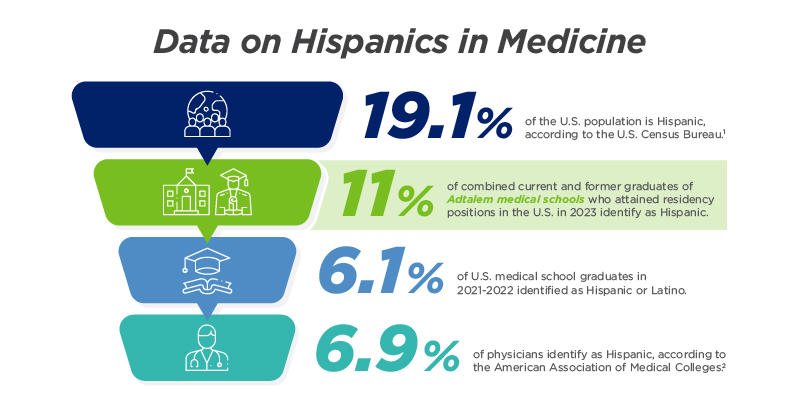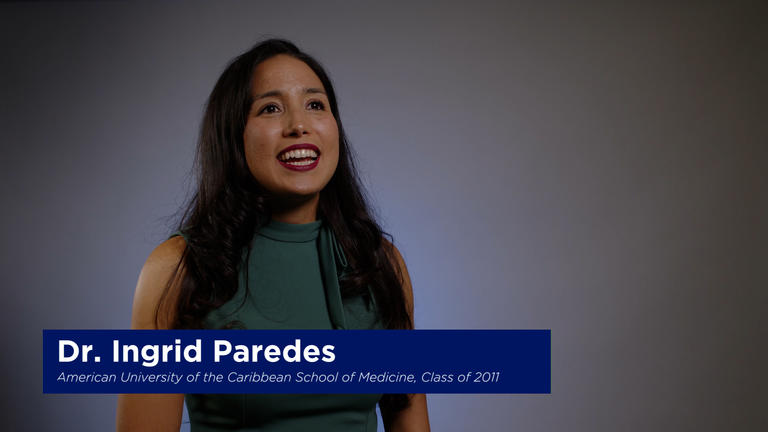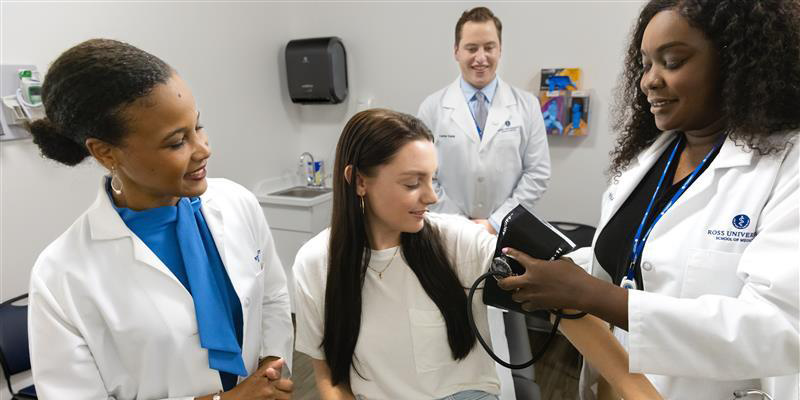Taboos, language barriers, and health disparities contribute to higher Hispanic mortality. Compassionate care makes a difference.
At FemCare OB-GYN, an obstetrics and gynecology practice in Miami, a 29-year-old woman who recently arrived from Nicaragua was seeking help for severe abdominal pain. She had been suffering with it for months. She was desperate, distraught, and crying as she struggled in Spanish to voice her symptoms.
Thankfully, Dr. Ingrid Paredes was on duty. She was able to calm the patient, listen to her, promptly diagnose a treatable condition, and prescribe the necessary treatment. All because the Cuban born Dr. Paredes spoke to the patient in Spanish and embraced cultural competence in healthcare.
“She was very intimidated and very sick, but couldn’t speak the language, so when I spoke Spanish, her face just lit up,” says Dr. Paredes, a graduate of the American University of the Caribbean School of Medicine (AUC), an Adtalem Global Education institution. “Breaking that language barrier created an immediate rapport and connected us so that she could trust me. She shared that she wasn’t sexually active so didn’t think she should go to an OB-GYN. Most of my patients are patients like her who can’t speak the language and are very afraid to seek medical care.”
Addressing Hispanic Maternal Health Disparities
The experience speaks volumes about the racial health disparities, cultural and socioeconomic barriers, and limited access to health care faced by Hispanic women. As Dr. Paredes and other medical professionals have discovered, communication and understanding can save lives. Speaking the same language as a patient has been associated with fewer medical errors and better outcomes.
It also opened the door for Dr. Paredes to intuitively understand the root of the patient’s hesitancy—cultural taboos and shame surrounding the bodies of young, unmarried Hispanic women. The implication is if a young woman sees an OB-GYN, she is sexually active, she explains.
Cultural competency plays a vital role in addressing the unique challenges faced by Hispanic women and improving their care. This is especially important as the maternal mortality rate for Hispanic women is up 44% from 2019 to 2020, with 18.2 deaths per 100,000 according to the latest available data from the Centers for Disease Control and Prevention.
“At AUC, one of our objectives is to prepare medical students to establish relationships with patients across a broad spectrum of cultural and socioeconomic backgrounds based on respect and empathy,” says Dr. David Pryluck, senior associate dean of the Sint Maarten campus. “One of the ways we do this is by teaching patient-centered interviewing that explores their feelings, beliefs, fears, and expectations.”
What’s more, cardiovascular disease is the No. 1 killer of new moms, according to the American Heart Association. Their new campaign “My health is our health”/“Mi salud es nuestra salud” is raising awareness among Hispanic/Latina moms, especially during pregnancy, about the importance of managing their blood pressure.
Data on Hispanics in Medicine
Speaking Up and Making a Difference
Dr. Paredes is not silent about the significant challenges language barriers and cultural taboos create in health care. She is working patient by patient, birth by birth, to take aim at racial gaps in maternal health care.
A mother of three young children, she is committed to acknowledging and respecting cultural taboos, traditions, and beliefs related to pregnancy and childbirth within the Hispanic community, which she strongly believes leads to better patient-provider relationships and adherence to medical recommendations.
In July, she was named one of the first five physicians in the nation to earn the 2023 Women’s Choice Award. The national organization recognizes healthcare providers who demonstrate exceptional service and a commitment to empowering women to make informed healthcare choices.
“I really believe that by being a bilingual and culturally sensitive doctor, I can empower my patients to ask questions, voice concerns and actively participate in their health care decisions,” she says. “I strive to be that compassionate listener who can encourage them and offer maternal care at every stage of their lives.”
Journey from Cuban Immigrant to U.S. OB-GYN
For more information, email the Adtalem Global Communications Team: adtalemmedia@adtalem.com.







